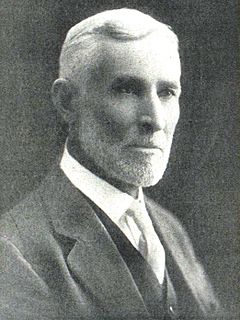A Quote by Henry David Thoreau
Government is at best but an expedient; but most governments are usually, and all governments are sometimes, inexpedient. The objections which have been brought against a standing army, and they are many and weighty, and deserve to prevail, may also at last be brought against a standing government.
Related Quotes
I heartily accept the motto, "That government is best which governs least"; and I should like to see it acted up to more rapidly and systematically. Carried out, it finally amounts to this, which also I believe — "That government is best which governs not at all"; and when men are prepared for it, that will be the kind of government which they will have. Government is at best but an expedient; but most governments are usually, and all governments are sometimes, inexpedient.
I do verily believe that if the principle were to prevail of a common law being in force in the United States (which principle possesses the general government at once of all the powers of the state governments, and reduces us to a single consolidated government), it would become the most corrupt government on the earth.
There is one view of the subject which ought to have its influence on those who espouse doctrines which strike at the authoritative origin and efficacious operation of the Government of the United States. The Government of the U.S. like all Governments free in their principles, rests on compact; a compact, not between the Government & the parties who formed & live under it; but among the parties themselves, and the strongest of Governments are those in which the compacts were most fairly formed and most faithfully executed.
Inspired men have been raised up, who have given us our form of government, and the code of laws by which we are controlled, the best ever evolved by man, so far as we are able to judge. The Lord has strengthened the arms of the patriots who have defended us against the assaults of all those who have come up against us, and delivered us until today, from those who would have torn us asunder. Against all opposition, I sometimes think almost against ourselves, the Lord has brought us to our present condition, until this nation, like a city set on a hill, has become the light of the world.
Societies exist under three forms sufficiently distinguishable. 1. Without government, as among our Indians. 2. Under governments wherein the will of every one has a just influence, as is the case in England in a slight degree, and in our states, in a great one. 3. Under governments of force: as is the case in all other monarchies and in most of the other republics. To have an idea of the curse of existence under these last, they must be seen. It is a government of wolves over sheep.
Governments, like clocks, go from the motion men give them, and as governments are made and moved by men, so by them they are ruined too. Wherefore governments rather depend upon men, than men upon governments. Let men be good, and the government cannot be bad; if it be ill, they will cure it. But if men be bad, let the government be never so good, they will endeavour to warp and spoil it to their turn.
By a declaration of rights, I mean one which shall stipulate freedom of religion, freedom of the press, freedom of commerce against monopolies, trial by juries in all cases, no suspensions of the habeas corpus, no standing armies. These are fetters against doing evil which no honest government should decline.
The Constitutional Convention debated whether America should even have a standing army. ... They worried that a powerful military could rival civilian government for power in our new country, and of course they worried that having a standing army around would create too much of a temptation to use it.





























